For one of my PhD experiments investigating hierarchical imitation, I had to train two Blue-throated Macaws in a problem-solving task. One of them was called Sherlock, and the other Charlie. Both of them have been my favourites all along as they can be a trainer’s delight for their behavioural flexibility. Sherlock got trained very easily, no huss and fuss, acquiring a complex concept of solving the hierarchically structured task in a particular sequence. Charlie on the other hand, was supposed to acquire the task using a different sequence. But this time, he started being an experimenter’s nightmare. He refused to take interest in learning, hardly cared about the task and was only motivated to participate in a different experiment. Days went by and nothing could change his demeanour. I started panicking as this was extensively delaying my experiment. I could not use any other bird as that would reduce my sample size. After discussing with my supervisor Dr. Auguste von Bayern, we decided, ‘our only hope now is Sherlock’. I had very faint hope as retraining Sherlock for the other sequence would mean not just learning a new sequence but discriminating it from the previous one which can take a long time- I almost started postponing my yearly trip back home to India. But then Sherlock showed what birds can do! I started training him for the new pattern and within just one week, he learnt it. The best part is, he could discriminate between the sequences easily (I did not expect this at all), thus acquiring both techniques to solve the problem. We soon completed our experiment, with Sherlock Holmes once again proving that he can do it all. And, once again I was amazed to find out how intelligent birds are!
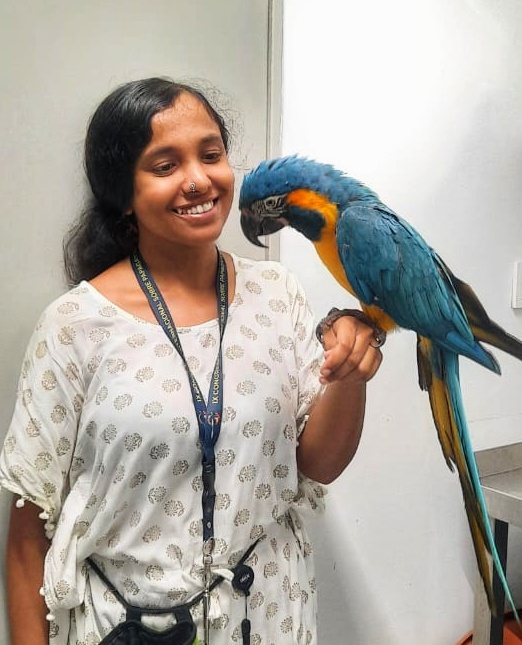 Sherlock Holmes, the Blue-throated Macaw who can do it all.
Sherlock Holmes, the Blue-throated Macaw who can do it all.
This is how my interest in birds and nature took shape..
I was born in a village of the South 24 Paraganas district of West Bengal, India. I spent my early childhood chasing monitor lizards along the ponds, catching dragonflies, watching spectacled cobras with ‘hundreds of babies’ (through my five-year-old eyes, they seemed hundreds) crawling everywhere. I bore the love for snakes from my very childhood and wanted to become a herpetologist. I don’t even remember noticing any bird during those times. We moved to the city of Kolkata for my primary and high school education and even when I joined Presidency University, Kolkata for doing my Bachelors in Zoology, I still wanted to become a herpetologist.
Then came a trip and guidance from a teacher, which changed my aspiration forever. Dr. Kamal Kumar Bannerjee, the then HoD of Zoology department of Presidency University, was an avid birder and foremost a great teacher. We went for our first excursion to the Sundarbans Tiger Reserve and for the first time, I observed birds; and not just saw them. The thrill of watching a Short-toed Snake-Eagle with a snake catch or a Eurasian Curlew on the mud bank opened my eyes into the world of flying colours. Soon, I started Presidency University Nature Club, organised bird watching walks and then there was no turning back. My love for snakes was not lost, only my passion for birds had increased multifold.
When I started my Masters in Zoology in Presidency University, the decision to become a researcher and do a PhD in Ecology or Ethology had already been made. Still, I did not know exactly which field would invoke my interest for long enough to dedicate my whole academic career to it. I did my Masters internship at Salim Ali Centre for Ornithology and Natural History to get exposure to field work in ornithology. After my Masters, I joined as a Junior Research Fellow at IISER Mohali working on Rose-ringed Parakeets and Jungle Babblers. While working on Jungle Babblers, I discovered the field of socio-cognition in animals. The rare teaching behaviours displayed by tandem-running ants, meerkats, and Southern Pied-Babblers—a species closely related to the Jungle Babbler—sparked my interest in animal cognition and social learning processes like imitation and teaching. I wanted to conduct experimental studies with birds under controlled conditions which was not quite feasible in the wild and these kinds of studies were mostly restricted to insects or fishes in laboratories across India.
Then I applied for IMPRS for Organismal Biology (now Animal Behaviour and Biological Intelligence) and got accepted into Comparative Cognition Research Group headed by Dr. Auguste von Bayern. I received a DAAD scholarship for pursuing a PhD at Max Planck Institute for Biological Intelligence erstwhile Ornithology, Seewiesen, Germany and got enrolled at Ludwig-Maximillian University, Munich. Since then there has been no stopping…..
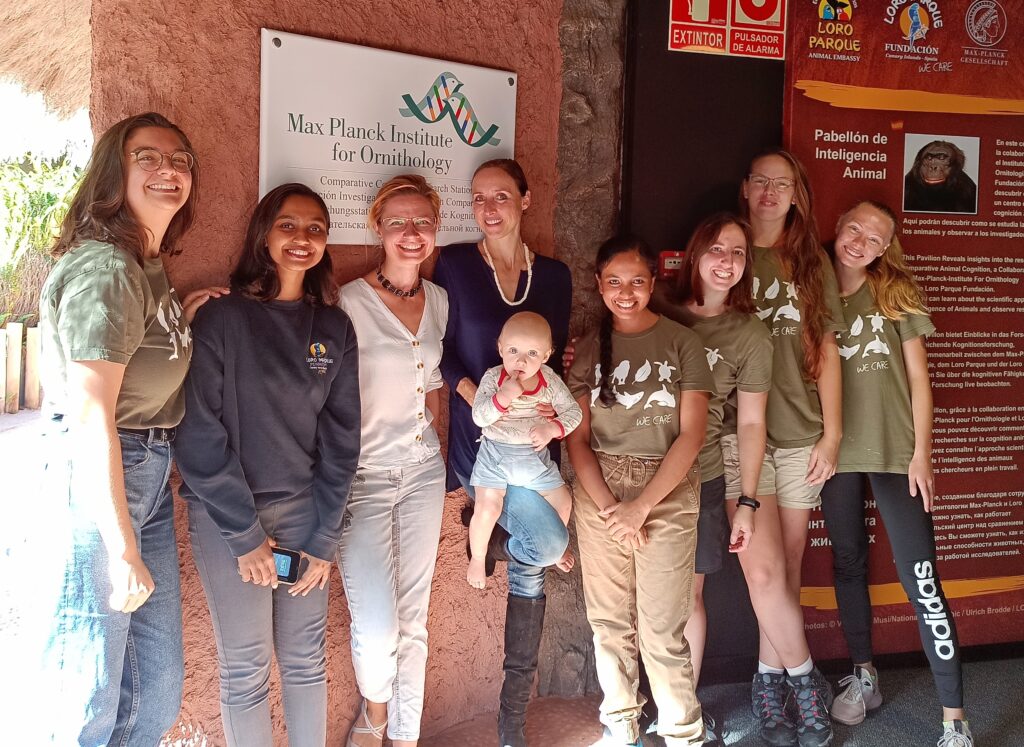 The Comparative Cognition Research Group at Loro Parque Research Station, Tenerife.
The Comparative Cognition Research Group at Loro Parque Research Station, Tenerife.
I love what I do because…
My lab is situated on the beautiful island of Tenerife in the Canary Islands archipelago inside Loro Parque Fundación. Loro Parque is one of the leading zoos in the world with the largest congregation of parrot species, devoted to their ex-situ as well as in-situ conservation. The main focus of our group is to strengthen our understanding of parallel cognitive evolution in the avian taxa of parrots compared to the distant mammalian taxa of cetaceans and great apes. My PhD thesis is on ‘Motor and vocal imitation in parrots’. Parrots have been well known for their vocal production learning, but very few know about their capacity to form complex concepts, tool-use and having distinct foraging cultures in the wild. My aim is to illustrate another complex social learning ability of motor imitation and motor production learning in parrots, previously thought to be exceptional to primates, cetaceans and dogs and bridge this gap in our understanding of evolution of social cognition in animals.
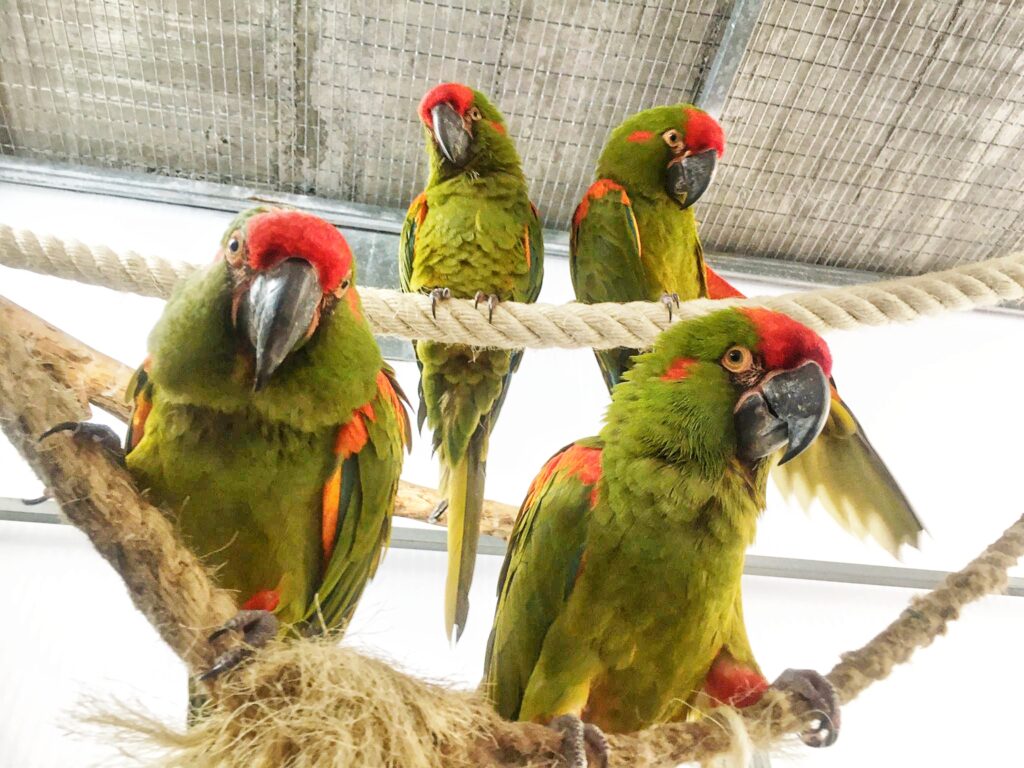 The Boy Band- Red-fronted Macaws: Khal and Tyrion on top; Tormund and John Snow below
The Boy Band- Red-fronted Macaws: Khal and Tyrion on top; Tormund and John Snow below
The best part of my work is THE PARROTS. I study the social learning abilities of some critically endangered Ara macaw species like Blue-throated Macaws, Great Green Macaws and Red-fronted Macaws. The opportunity to handle, train and work so closely with such magnificent animals, whose numbers have critically dwindled in the wild due to anthropogenic disturbances, and getting to understand their complex cognitive capacities, amazes me every moment. Additionally, the opportunity of getting to know and collaborate with great scientists for work, supervising young students, attending conferences and giving talks, exchanging ideas and getting to know so many beautiful minds is a reward of different value.
At the end of a hard working day when everyone is gone and Luna (a people pleasing Great Green Macaw) waits there for me to get some attention, she gently climbs onto my arm, and we spend some time in the office, there is nothing so blissful like this.
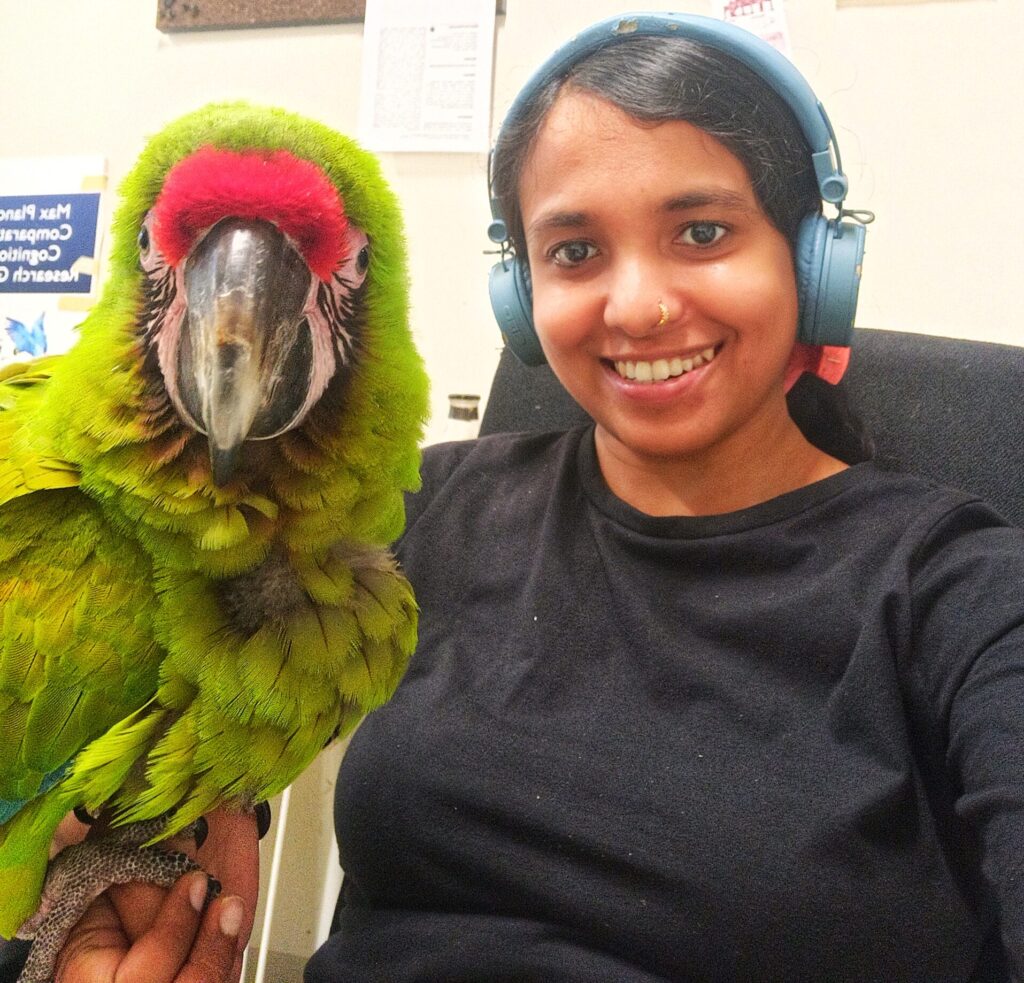 Luna, the Great Green Macaw who loves human attention!
Luna, the Great Green Macaw who loves human attention!
Challenges I have faced..
The particular challenge that I have faced in my work is training some of the parrots for experiment. There is a huge variation in personalities within species, they can test one’s perseverance to another level. Those events have taught me when to take a step back, when to try to push further and when to let go. In the lab parrots can be tested with enormous efficiency if the experimental protocol works well, which is often unforeseeable as we are working with a highly intelligent group of species mirroring great apes in their cognitive abilities. Staying abroad is a bit of a challenge when one has to move between two countries- Germany and Spain and their cultures- sometimes a sense of belonging nowhere crawls in. It is some of the friendships with colleagues and the constant support from my supervisor in everything that have always pushed me through.
Another challenge that pushed me to choose a research facility abroad, is the lack of scientific collaboration between research Institutes and zoos of India for conducting experimental research with the animals. There are many critically endangered species, for example the Blue-throated macaws, about whom we would hardly be able to know if we do not conduct research on them ex-situ. Some of the best research institutes conduct their cognitive research on animals in collaboration with zoos (For example, the famous Wolfgang Köhler Primate Research Center of MPI for Evolutionary Anthropology inside Leipzig Zoo) and there is a high need for such long term collaborations in India.
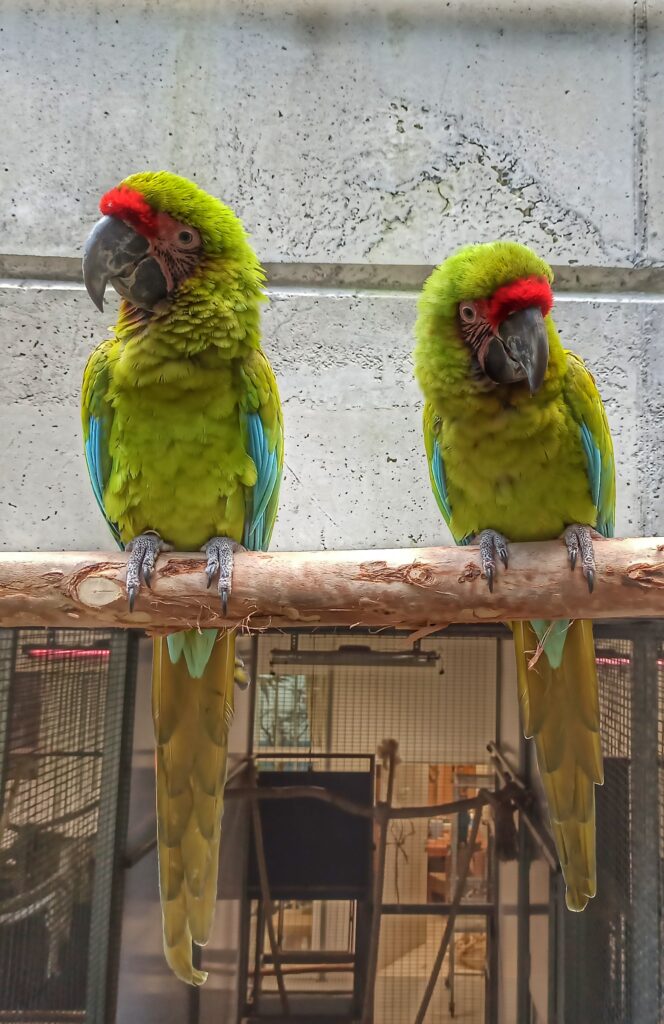 The Great Green macaws- Hagrid and Alba, chilling in the afternoon in the CCRG facility inside Loro Parque Zoo in Tenerife, Spain
The Great Green macaws- Hagrid and Alba, chilling in the afternoon in the CCRG facility inside Loro Parque Zoo in Tenerife, Spain
My advice to young researchers is…
My advice for young researchers is to gain experience as much as possible through internships or workshops in different fields, before deciding which research area to pursue for a PhD. Any bad or unfulfilling experience does not mean that the next one will be the same. Keep on applying for scholarships and grants and do not fall hopeless with rejections. It might take time, but it will happen for sure. Meanwhile, from your Master’s studies onwards, try gaining expertise in statistical tools like R which is free and other programming languages. And practising good ethical science is above anything else.
In the end, working with birds can be the most rewarding experience of a lifetime. Whether you are working in a lab or in the field, only perseverance and optimistic attitude is going to provide those life altering moments that you have been striving for so long.
Esha Haldar
[email protected]
IMPRS PhD student, Max Planck Institute for Biological Intelligence
Ludwig-Maximillian University of Munich
Lab Profile
X (Twitter) handle

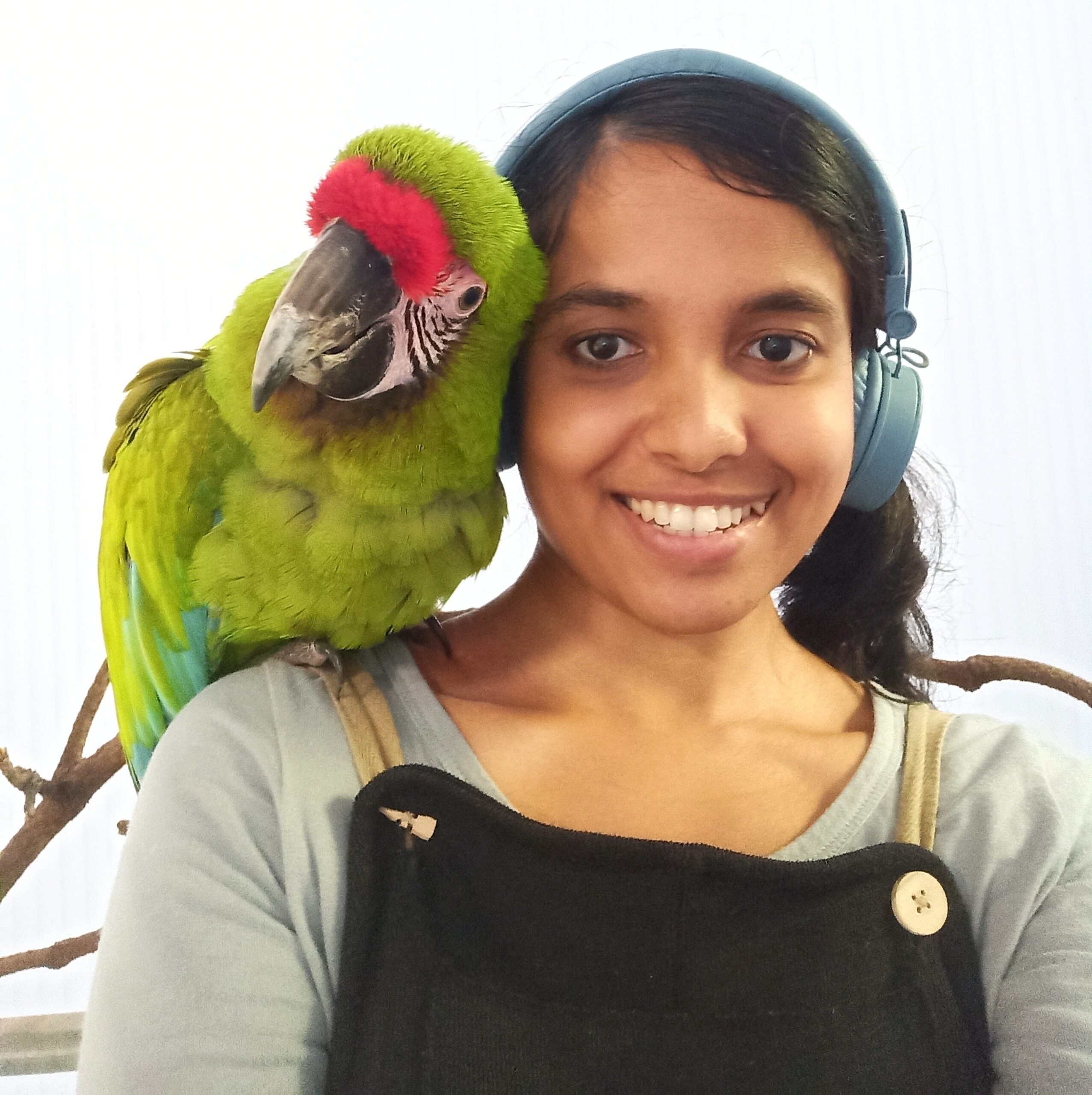
a very insightful read! keep up your great work.
What a wonderful narrative,inspiring